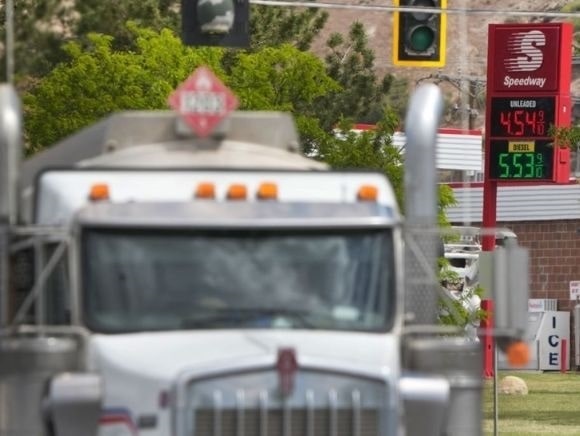The energy issue has metastasized into a crisis for President Joe Biden and leaders worldwide. In the United States, a gallon of gasoline is at an all-time high of $4.60, a barrel of West Texas Intermediate (WTI) crude oil is north of $100, and natural gas prices are above $9 for the first time since 2008. So, diesel flirting with record levels is not too surprising, but it does not diminish the significant risks to the US and global economy as the commercial and industrial sectors depend on the fuel source to produce food, ship goods, and construct buildings. Everywhere the American people turn, they see a crisis.
Running on Fumes
The national average diesel price is about $5.54, according to the American Automobile Association (AAA). Several states, particularly in the northeast, are enduring prices well above $6. Diesel prices in New York are at around $6, while Massachusetts is suffering from $6.33. And, yes, California could be eyeing $7 within the next month. Indeed, the gap between gas and diesel prices has never been wider.
But why is diesel so high that some trucking firms are terminating their employees and struggling to make ends meet? The primary factor is supply, as inventory levels in the northeast have been at their lowest since the 1990s. Nationally, diesel stocks are at a 17-year low. The situation has become so dire that the White House is reportedly considering tapping the country’s 22-year-old emergency diesel reserve for the first time in a decade. But this would only serve as a week-old band-aid since he would likely inject one million barrels of diesel. By comparison, the US consumes nearly three million barrels (or 122 million gallons) a day of diesel.
One of the chief problems has been the growing number of refineries that have retired. Across the US, there are only 129 refineries. On the eastern seaboard, there are only seven refineries. For the remaining facilities, it has become challenging to process enough crude oil to satisfy demand. Today, east coast-based refiners are processing approximately 800,000 barrels per day (bpd). In 2009, these entities were completing more than 1.6 million bpd. This is ubiquitous across the globe, too, with an estimated three million bpd of refining capacity coming offline in the last two years.

(Photo by George Frey/Getty Images)
Mike Jennings, CEO at refiner HF Sinclair and Holly Energy Partners, provided a morose take on the state of refinery capacity in a first-quarter earnings call last week: “As you well know, one million barrels of distillation capacity has exited the system since pre-pandemic. How long that persists? I don’t see any signs of it ending soon or well.” John Auers, executive vice president at energy consultancy Turner, Mason & Co, was even more pessimistic, recently telling Bloomberg: “We’re ripe for a potential supply crisis.”
The only positive development has been the increase in domestic distillate inventories, which include diesel and heating oil. Data from the Energy Information Administration’s (EIA) weekly Petroleum Status Report highlighted two consecutive weeks of buildup totaling nearly three million barrels. Unless there is a significant increase in stocks and an enormous amount of production, it might be inevitable that diesel rationing becomes the norm in the coming months on the east coast.
Derailing the Economy?
Although soaring gasoline prices have made headlines everywhere, making US households feel the pinch, skyrocketing diesel costs will decimate the global economy. Diesel has many practical uses: large construction equipment, farming machinery, public transportation, and cargo shipping by rail, boat, and truck. If truckers reduce their mileage, less food hits supermarket shelves. If massive ships are paying more for fuel, it is going to cost retailers more money to import products, forcing them to pass the costs onto the consumer. If farmers cannot balance their books because of soaring energy costs, there might not be much of an incentive to grow crops. Suffice it to say, the diesel crisis brewing in the US and the rest of the globe might not be the sole reason for an economic downturn, but it could be one of the many hefty factors for a recession.




